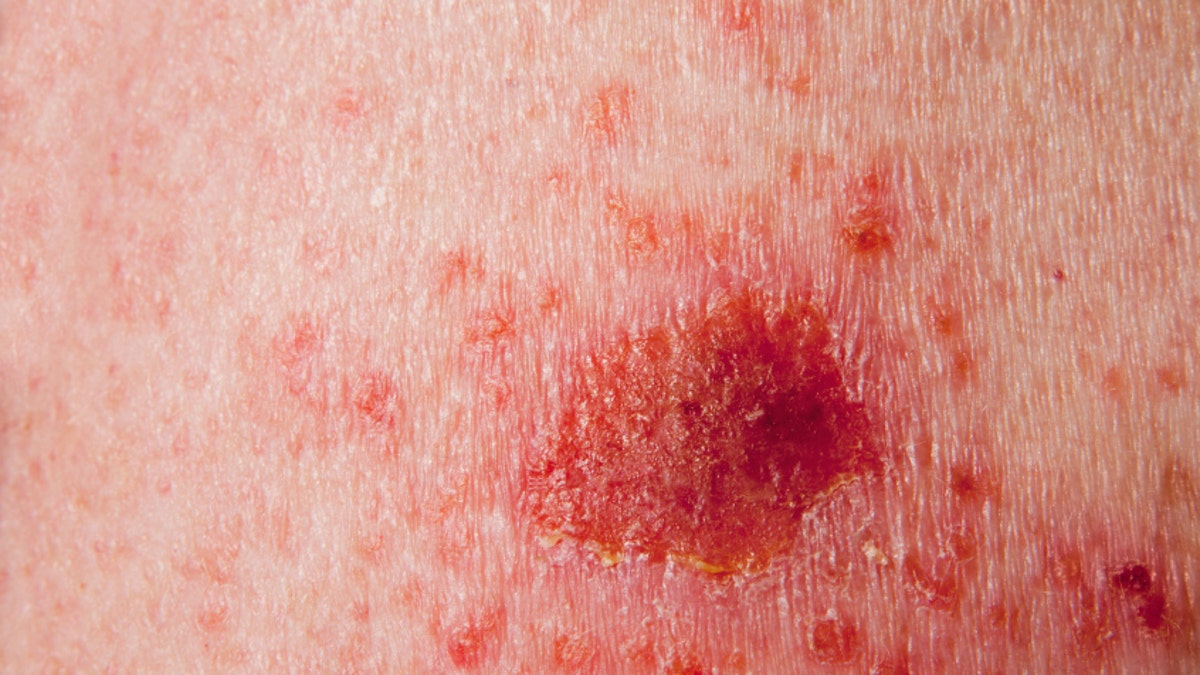
Close up of a basal cell carcinoma skin cancer. (istock)
A diagnosis of skin cancer isn't something anyone wants to receive, but contracting the disease may actually have a protective effect when it comes to another devastating illness.
In a new study, researchers from Albert Einstein College of Medicine in Bronx, NY have revealed that individuals who develop non-melanoma skin cancers may have a lower chance of developing Alzheimer’s disease.
“The theoretical basis for thinking that there could be a relationship comes from the fact that Alzheimer’s and cancer are opposites kind of disorders in terms of cell division,” lead author Dr. Richard Lipton, of Albert Einstein College and a fellow of the American Academy of Neurology, told FoxNews.com. “What I mean by that is that in Alzheimer’s, specific populations of cells simply die, while in cancer, the cells divide and divide and become nearly immortal. So there’s a notion that individuals who have a tendency towards this cell division may have protection against Alzheimer’s.”
Lipton and his colleagues followed a cohort of 1,102 individuals with an average age of 79 for approximately 3.7 years. While none of the participants had dementia at the study’s onset, 109 individuals reported they had been diagnosed with skin cancer in the past. During the course of the study, 32 more people developed skin cancer and 126 people developed dementia – 100 of those cases evolving into Alzheimer’s.
Notably, of the 141 people with skin cancer, only two developed Alzheimer’s disease – meaning skin cancer patients were 80 percent less likely to have this kind of cognitive impairment. However, cancer’s protective quality was only seen in regards to Alzheimer’s and not with other kinds of dementia such as vascular dementia. The link also did not apply to melanoma, the least common but most aggressive form of skin cancer.
While Lipton and his colleagues do not know exactly why these two conditions have an inverse relationship, they offered up a few theories in addition to the original cell division theory.
“The biggest risk factor for skin cancer is sun exposure, so maybe people outside playing tennis, who are healthy and more vigorous get more sun exposure, but their physical activity and high vitamin D levels are actually protective against Alzheimer’s,” Lipton said. “We need to understand the mechanisms of the effect better, and if it’s related to some environmental risk factor.”
However, Lipton noted that physical exercise does not reduce an individual’s risk of Alzheimer’s to the extent that skin cancer did in the study, so it is more likely that biological and genetic factors are involved in the relationship.
Meanwhile, Lipton said the findings are not meant to discourage individuals from wearing sunscreen or taking measures to avoid skin cancer. Instead, the researchers hope to expand on their study to get a better understanding of the underlying mechanisms of these two diseases. If they find that the cell division hypothesis explains skin cancer’s protective quality in regards to Alzheimer’s, Lipton said the discovery could open up doors to new ways of studying the diseases – and ultimately new treatments.
“Let’s say the issue is really one of cell division,” Lipton said. “If we knew that to be true, we might try to develop drugs that could optimize the balance between cell division and cell death without a cause.”
The research was published online in the journal Neurology.
